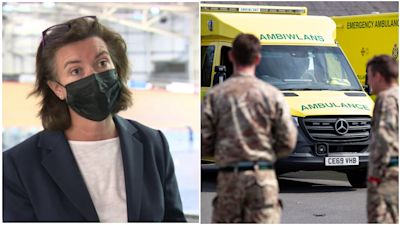NHS in Wales to face 'difficult situations' as ambulance army support ends amid rising Covid cases

Wales’ health service could face some “difficult” situations as the ambulance army support comes to an end amid Covid hospitalisations at their worst for a year. The rise in Covid cases is being driven by BA2 subtype of the omicron variant of coronavirus - with one in 25 people in Wales currently infected, Eluned Morgan has said. The health minister told a press conference on Tuesday (March 22): “All the signs show it is even more transmissible and faster moving than the original Omicron variant. “And re-infection rates are high – so even if you’ve had Covid before, unfortunately it won’t mean you are immune to BA2. “We had expected to see a rise in case rates as we gradually relaxed protections but the BA2 sub-type is pushing infections up rapidly.”
It comes as Mark Drakeford and his cabinet decide this week whether or not to bring to an end to all remaining restrictions. And the support given to the Welsh Ambulance Service during the winter months comes to a close at the end of March. How will the health service cope with this extra demand? “There has been a huge recruitment exercise in terms of people joining the ambulance service,” Ms Morgan said. “But there could be a couple of weeks where there could be some difficult situations as we see the number of people leaving us who’ve given us great support from the army in the winter period.” The health minister said the NHS is working on better systems of ambulatory care and some patients will be directed towards same day services instead of A&E. Data shows that levels of Covid infections have been rising in all four UK countries - with the new BA2 sub-type taking over as the dominant form of the virus.
Ms Morgan added: “We believe the clinical severity of the BA2 sub-type is similar to the original variant of omicron, which thankfully for most people, will mean they will experience mild symptoms. But this doesn’t mean that everyone will have a mild illness."We are watching the levels of illness in older people very carefully. And there has been a spike in hospital admissions in all age groups over the last couple of weeks.
"There are currently more than 1,200 Covid-19 patients in hospital beds at the moment – this is the highest level we have seen since last March and it is set to rise further."